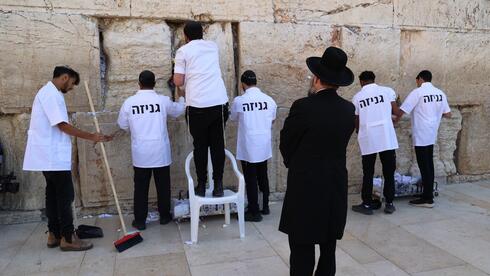Tens of thousands of notes, placed between the ancient stones over the past six months, were carefully removed and transferred for religious burial, known as genizah.
3 View gallery


Western Wall Rabbi Shmuel Rabinowitz oversees workers clearing prayer notes at the site
(Photo: The Western Wall Heritage Foundation)
The removal followed strict religious guidelines, using gloves and disposable wooden tools to preserve the sanctity of the site and the privacy of the notes’ contents. The collected notes were placed in special sacks and will be buried alongside worn-out holy books.
According to the foundation, hundreds of notes are sent daily via its website, in addition to the hundreds of thousands placed in person by visitors and worshippers throughout the year.
This year, however, foundation officials noted an unusual trend—messages sent through the website from citizens of hostile nations, including Iran, Yemen, Iraq, Qatar, Lebanon and Pakistan. Many of these notes contained emotional pleas for peace, reconciliation and stronger ties between nations.
In addition, tens of thousands of other messages were sent to the Wall in recent months from Israel and around the world, including from IDF soldiers, security forces, the wounded, families of hostages and bereaved families—either via the website or during personal visits to the site.




